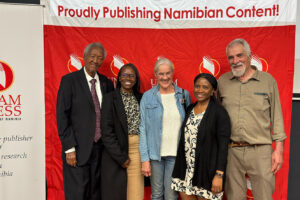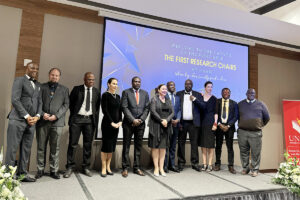The University of Namibia has signed a memorandum of Understanding with the Namibian Correctional Services, marking the beginning of a five-year collaboration that will cover 10 areas of common interests.
The areas of cooperation include, among others, research, programme development and training of staff, offenders and students, as well as access to facilities and professional equipment for the purposes of training, education and improved services.
Present at the signing were Professor Kenneth Matengu, UNAM Vice Chancellor, General Raphael Hamunyela, Commissioner-General of NCS, along with staff members of both institutions.
Speaking at the signing ceremony, General Hamunyela touched on the importance of collaborating with UNAM, particularly in the field of agriculture. “As you know, the Namibian Correctional Services is investing in agriculture to train inmates,” he explained.
He further clarified that the training would equip inmates with relevant skills that will enable them to produce their own food upon release. It will also ensure self-sustainability for Namibian prisons by feeding the inmates from their own produce.

Prof. Matengu also reflected on the potential benefits of the strategic partnership for both parties. “UNAM has qualified human resources in a number of areas, which we can deploy to work with the Namibian Correctional Services, especially in the area of research, programme development and capacity building,” he elaborated.
He also expressed an interest in conducting research that would focus on the various circumstances under which different crimes were committed, in order to establish preventive programmes that will be shared with communities, as well as rehabilitation programmes for inmates.
Reflecting on the partnership, the Vice-Chancellor raised the following sentiment: “It’s a wonderful opportunity not just for staff, but also for our students.”
The signing was concluded by the Vice-Chancellor stating that the next phase of the UNAM and NCS collaboration is to define the sort of activities that will be carried out each year, as well as assigning budgets to ensure the success of this endeavour.
Article by Michelle Sibusiso Ncube





